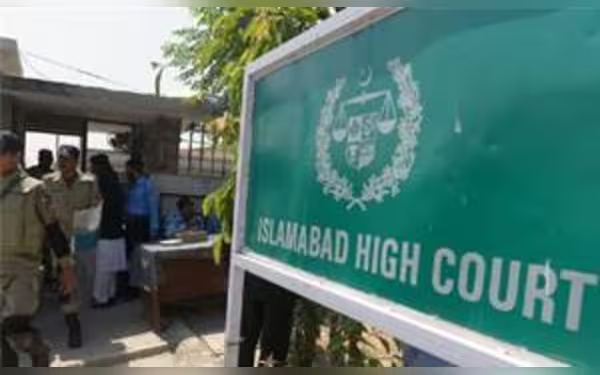Friday, October 4, 2024 04:36 AM
IHC Bars Executive Magistrates from Final Judgments in Islamabad Trials
- IHC restricts executive magistrates' judicial powers.
- Judicial authority must remain with the courts.
- Government directed to issue necessary notifications.
 Image Credits: nation_pk
Image Credits: nation_pkIHC restricts executive magistrates from issuing final judgments, emphasizing judicial authority must remain with the courts.
The Islamabad High Court (IHC) has recently made a significant ruling that impacts the judicial landscape in the capital territory of Pakistan. In a decision that underscores the separation of powers, the court has restrained executive magistrates from passing final judgments or orders in trials that are currently pending before them. This ruling is rooted in the Constitution, particularly emphasizing the importance of judicial authority being exercised solely by the courts.
The case was brought to the IHC's attention by a lawyer named Luqman Zafar Advocate, who argued that executive magistrates were overstepping their bounds by exercising judicial powers. The petition highlighted that these magistrates were not adhering to the procedural rules established by the high court, which are designed to ensure fair and just legal processes. The court, led by Justice Arbab Mohammad Tahir, agreed with this perspective, stating that only courts have the authority to exercise judicial powers.
During the proceedings, the assistant attorney general presented a counterargument, noting the overwhelming number of cases in the judicial system. He suggested that the executive magistracy had been recognized by the Supreme Court and did not infringe upon judicial functions. However, the IHC maintained that the powers granted to executive magistrates were not in line with constitutional provisions, particularly Articles 175 (3), 202, and 203.
Justice Arbab's judgment, which spans 22 pages, clearly articulates that the delegation of judicial powers to executive magistrates is unconstitutional. He pointed out that the legislative body had already taken steps to address this issue through the promulgation of the 1st Amendment Ordinance, yet the federal government had failed to issue the necessary notification to enforce these changes. The court noted that the delay in implementing these provisions has persisted for over two decades, which is unacceptable.
In a decisive move, the IHC has directed the government to issue the required notification promptly. Until this notification is issued, executive magistrates are prohibited from making final judgments or orders. Furthermore, any ongoing criminal trials that fall under their jurisdiction must be transferred to the appropriate sessions judges, who will then assign them to competent judicial magistrates for further proceedings.
This ruling is a crucial reminder of the importance of maintaining the integrity of the judicial system in Pakistan. It reinforces the principle that judicial powers should not be diluted or misused by executive authorities. As the legal landscape continues to evolve, it is essential for all stakeholders, including the government and the judiciary, to work collaboratively to uphold the rule of law and ensure that justice is served fairly and impartially.
The IHC's decision serves as a pivotal moment in the ongoing discourse about the separation of powers in Pakistan. It highlights the necessity for clear boundaries between the executive and judicial branches, ensuring that justice remains a cornerstone of the legal system. As citizens, it is vital to stay informed about such developments, as they directly impact our rights and the functioning of democracy in the country.













